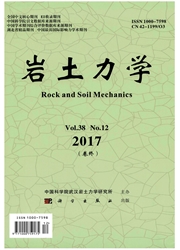

 中文摘要:
中文摘要:
膨胀土的结构、胀缩机制、力学特性和改良方法等方面已有广泛研究,但关于膨胀土长期压缩特性研究甚少,而需对膨胀土地区路基长期稳定性、隧道开挖对地基及地下构筑物长期影响的研究,使得膨胀土长期压缩特性的研究变得尤为重要。采用取自南宁地铁东站某基坑膨胀土进行长期一维压缩试验,研究固结压力、含水率分别对压缩指数Cc、次压缩系数C a的影响、压缩指数Cc与次压缩系数C a的关系、预压处理和石灰处治对膨胀土长期压缩特性的影响,寻求降低膨胀土次压缩性的最佳方案。试验结果表明,南宁膨胀土的压缩指数与次压缩系数呈线性关系;与其他黏土相比,膨胀土次压缩特性较低;预压处理和改良处理可以减小土体的次压缩性,经预压处理的改良膨胀土次压缩性最低。
 英文摘要:
英文摘要:
Despite increasing interests in various aspects of expansive soil behavior such as the structure of the expansive soil, properties of expansion and shrink, treatment measures, little is known about the nature and magnitude of secondary compression of the distinct sediment. However, long-term stabilization of subgrade and underground structures as tunnel excavation promotes the study of secondary compressibility of expansive clay. The secondary compression behavior of a typical expansive soil in Nanning was investigated. A series of long-term compressibility tests were conducted. The influence of compression pressure and water content on compression index Cc and coefficient of secondary compression Ca is discussed respectively as well as the relation between Cc and Ca. Moreover, the influence of precompression or lime-added dispose on secondary compressibility is studied to seek the best measure to reduce secondary compressibility. Some useful conclusions are drawn. The relation between Co and Ca is linear. The secondary compressibility of Nanning expansive clay appears little compared with other clays. The secondary compression can be minished effectively by precompression or lime-added dispose soil becomes less ifprecompressed simultaneously. Specially, the secondary compressibility of lime-added expansive
 同期刊论文项目
同期刊论文项目
 同项目期刊论文
同项目期刊论文
 Application of Ground-penetrating Radar on Geophysical Prospecting for the Building Foundation in Ka
Application of Ground-penetrating Radar on Geophysical Prospecting for the Building Foundation in Ka 期刊信息
期刊信息
